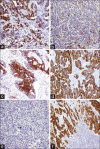Immunohistochemical staining of cytokeratin 20 and cytokeratin 7 in colorectal carcinomas: Four different immunostaining profiles
- PMID: 29637921
- PMCID: PMC5900473
- DOI: 10.4103/sjg.SJG_465_17
Immunohistochemical staining of cytokeratin 20 and cytokeratin 7 in colorectal carcinomas: Four different immunostaining profiles
Abstract
Background/aim: Aberrant expression of CK20/CK7 is reported in a percentage of colorectal carcinomas (CRC); however, its relation to clinicopathological variables and survival data is still unclear. The objective of this study is to explore patterns of CK20/CK7 immunostaining in CRC and to analyse the diagnostic, prognostic, and predictive role of patterns of CK20/CK7 immunostaining.
Materials and methods: A total of 144 CRC cases were retrieved from the archives at the Department of Pathology, King Abdulaziz University, Jeddah, Saudi Arabia. Immunohistochemistry was performed using antibody to CK7 and CK20. Immunostaining was defined as low and high by using the extent of staining. The association of CK7 and CK20 with clinicopathological characteristics and survival.
Results: CK20 was expressed in a higher percentage of CRC and nodal metastasis than CK7. No difference in CK7 and CK20 immunostaining in primary and metastasis carcinomas was found. Four patterns of CK20/CK7 were identified; CK20+/CK7- (60.4%), CK20+/CK7+ (2.1%), CK20-/CK7- (35.4%), and CK20-/CK7+ (2.1%). There was no statistically significant correlation between CK20/CK7 immunohistochemical profile and clinicopathological characteristics, prognosis, and survival was determined.
Conclusions: Our results may support the heterogeneity of CRC. CRC showed four different subclasses following patterns of relative CK20/CK7 immunostaining. A considerable number of CRC expressed aberrant immune profile of CK20/CK7, which should be considered during diagnosing CRC in metastatic regions. Further studies on larger cohorts correlating different immunohistochemical cytokeratin profiles to molecular subtypes of CRC are recommended for better understanding of pathogenesis and behaviour of CRC.
Keywords: CK20; CK7; CRC; prognosis.
Conflict of interest statement
There are no conflicts of interest
Figures


References
-
- Ross WA. Colorectal cancer screening in evolution: Japan and the USA. J Gastroenterol Hepatol. 2010;25(Suppl 1):S49–56. - PubMed
-
- Al-Madouj A, Alshahrani Z, Alrawaji A, Hayder M, Al-Shridah M, Al-Shamrani, T, et al. Cancer Incidence Report. Cancer Registry. 2016. [Last accessed on Dec 20 2017]. pp. 1–88. Available from: http://www.chs.gov.sa/Ar/HealthCenters/NCC/CancerRegistry/CancerRegistry...
-
- Al-Sohaily S, Biankin A, Leong R, Kohonen-Corish M, Warusavitarne J. Molecular pathways in colorectal cancer. J Gastroenterol Hepatol. 2012;27:1423–31. - PubMed
MeSH terms
Substances
LinkOut - more resources
Full Text Sources
Other Literature Sources
Medical
Research Materials
Miscellaneous
